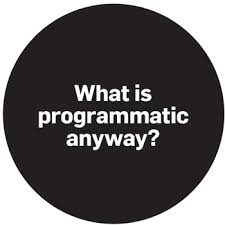Redefining Programmatic TV -- Steve Grubbs

The TV ecosystem should consider banning the term "programmatic" from its lexicon. There is too much baggage attached to it. Come up with another name.
Programmatic is largely misunderstood by TV folks, and it smells too much like RTB (real-time-bidding), which is anathema to most TV sales organizations. It conjures up memories of industry failures -- the eBay TV auction effort and Google TV. It is too much associated with all things digital, and deep in their hearts, many in the TV business are still reticent to join the digital evolution. (We're past the revolution stage.)
Despite the negatives associated with the word, the TV business needs to embrace the concept of programmatic -- and the sooner the better. I have recently been working on my advanced degree in programmatic buying under the tutelage of former co-worker Matt Prohaska and his consulting team. I'm convinced that programmatic should be a tool in every TV sales organization's toolkit. In its simplest form programmatic buying is the automation of the buying and selling process with research data layered in. The RTB aspect, with all its auctionesque connotations should not be a part of TV programmatic 1.0.
The need to develop a programmatic solution for the TV ecosystem is becoming more acute. TV buying was once one part art, one part science, one part negotiation prowess and one part buyer/seller relationship. The science piece (reaching the right audience at the most efficient price) has now subjugated its former partners. The art of crafting and buying packages of TV shows for an advertiser based on program environment is now outweighed by the need to buy cheap GRPs. Negotiation prowess, a boast of nearly every major buying agency, has been emasculated in a market where most advertisers now pay roughly the same annual, upfront cpm inflation rate with each TV network. And the famed buyer/seller relationship, another large agency new business claim, was seriously fractured when agencies, while trying to manage client procurement agents, began begging sellers for cost reductions and offering nothing in return. "We have a new client. We promised them a 20% cost savings. We really need your help this one." Sound familiar?
We are witnessing the democratization of TV buying. We are in the early stages of the Rise of the Machines. It's great news for the smaller buyers and sellers, because size no longer matters. (Ok, it does still matter, but not as much.)
One of the unintended consequences of personnel lay-offs at the media agencies in 2009-12, and the more recent cutbacks at the TV nets, is that everyone will need to do more with less. On the agency side the expanding roles and responsibilities of the traditional TV buyers (more digital, cross-device), the demands of client procurement, new business and the sheer volume growth of new TV vendors has left them time challenged. On the sales side … well, how difficult is it to get a meeting with a senior Media Agency executive these days, unless your name is Yaccarino, Abruzzesse, Ross, Levy or maybe a dozen others? With less manpower on the staffs of both buyers and sellers, automation of the TV buying process is critical.
Some TV networks are already developing and deploying their programmatic sales strategies. They see the train coming. Some are investigating programmatic platforms and still others are hoping to make it to retirement before that train arrives. There are several reasons why the TV industry has exercised caution in their embrace of the programmatic space. There is confusion about what programmatic is and is not. There are many who believe they still gain a benefit and competitive advantage from buyer/seller relationships. Sellers are concerned about ceding control over pricing and revenue generation. Some are concerned about job security. Others just don't believe they will see a significant return on the time, effort and investment required to build out a programmatic platform. Finally, some TV buyers question whether the current programmatic ad tech offerings are ready for primetime, so to speak.
There are different types of programmatic buying. While RTB should not be part of version 1.0, the creation of private exchanges between agency (or marketer) and TV nets would seem to be a wise first step. Pricing and deal making is managed directly between those two parties. The buy side can build their secret targeting sauce into their DMP and the sellers can maximize revenue through their own yield management systems.
One cautionary note … inventory offered through programmatic exchanges cannot be relegated to only the lowest rated, least desirable, remnant inventory. This is a recipe for failure.
Programmatic is so logical for the scatter market, and it seems like an obvious starting point … right after we change the name.
Steve Grubbs is President and founder of Second Act Media consultancy. Second Act advises media and emerging tech companies on how best to monetize their products and services across the advertising ecosystem. Steve can be reached at steve.grubbs@secondactmedia.com.
advertising ecosystem. Steve can be reached at steve.grubbs@secondactmedia.com.
Read all Steve’s MediaBizBloggers commentaries at My Second Act.
Check us out on Facebook at MediaBizBloggers.com
Follow our Twitter updates @MediaBizBlogger
The opinions and points of view expressed in this commentary are exclusively the views of the author and do not necessarily represent the views of MediaBizBloggers.com management or associated bloggers. MediaBizBloggers is an open thought leadership platform and readers may share their comments and opinions in response to all commentaries.


